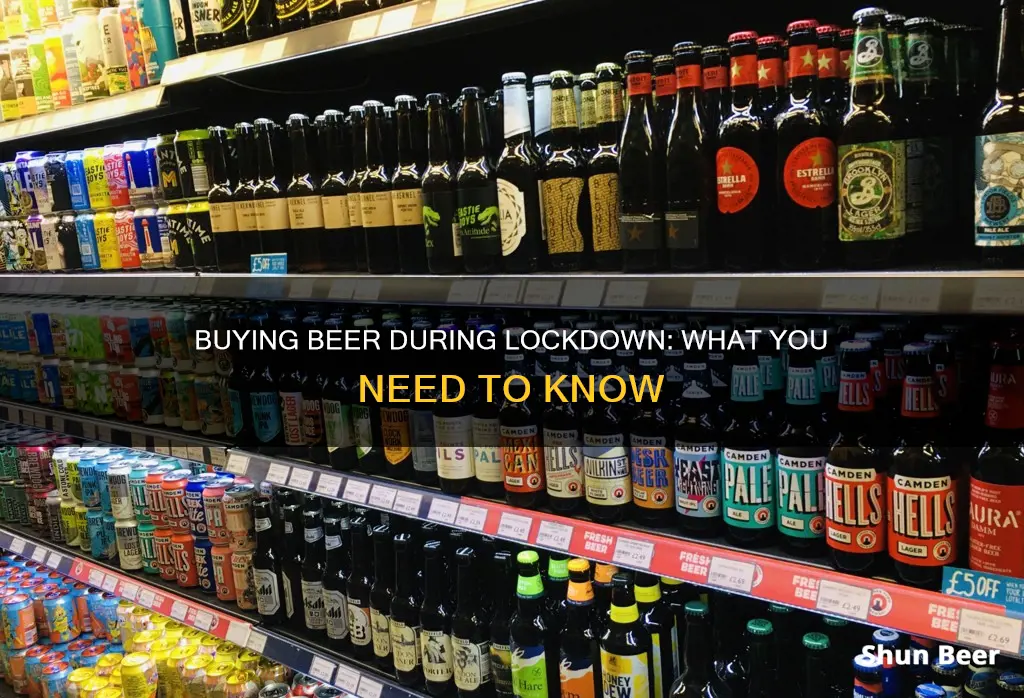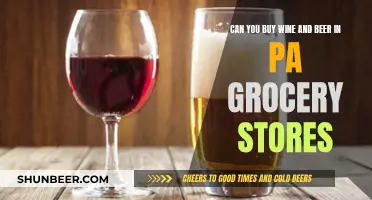
The COVID-19 pandemic and subsequent lockdowns have had a significant impact on the drinks industry, with many pubs, bars, and shops forced to close their doors. This has led to a shift in beer shopping behaviour, with consumers turning to online alcohol sales, home deliveries, or collection services. During the lockdown, beer was the second fastest-growing alcoholic drink in terms of value, just behind pre-mixed drinks. This growth can be attributed to consumers drinking more at home due to the closure of pubs and bars. However, the total beer sales still saw a decline, especially in countries like the UK, where wine and spirits became the preferred choice for consumers during the lockdown.
What You'll Learn

Beer delivery services during lockdown
Beer delivery services have been a popular alternative for beer lovers during the lockdown. Here is a list of some of the beer delivery services that were available during the lockdown:
- Beer52: This subscription service offers eight dark and light beers, a magazine, and snacks for £24.
- BeerWulf: BeerWulf offers a wide range of beers, including no and low-ABV, organic, vegan, and gluten-free brews.
- Signature Brew: This brewer offers a "Pub in a Box" case, which includes its core range of beers, beer glasses, beer mats, a vinyl record, pub snacks, a music quiz, and playlists.
- BeerBods: BeerBods offers a pack of 12 beers every 12 weeks and the opportunity to join the UK's largest live beer tasting every Thursday at 9 pm.
- HonestBrew: HonestBrew offers subscription boxes for armchair adventurers and die-hard pale ale fans, with mixed or IPA and pales-only options.
- BrewDog: BrewDog offers next-day deliveries and has launched a new app for home deliveries called Hop Drop.
- Hop Burns & Black: Hop Burns & Black offers a "sub club" with 10-12 beers, including small-batch collaborations and store exclusives, as well as beer tasting notes and food pairing tips.
During the lockdown, some breweries and shops delivered beer locally, while others delivered nationally. Some of the breweries that delivered beer locally include Barney's Beer, The Beer Cave, Campervan Brewery, Cork & Cask, and Ferry Brewery.
In South Africa, the Beer Association of South Africa (BASA) called for the 'off-consumption' beer trade to resume after President Cyril Ramaphosa extended the country's lockdown period. BASA proposed allowing licensed off-consumption outlets to sell beer, subject to strict social distancing requirements and restricted hours of trade.
In the UK, beer was the second fastest-growing alcoholic drink during the lockdown, with the category increasing by 27.3% in value. Corona saw a 40% increase in its UK sales in 2020.
Buying Beer on Sundays in Hattiesburg, Mississippi: What's Allowed?
You may want to see also

Beer shopping behaviour during lockdown
During the COVID-19 lockdown, the sale of alcohol was prohibited in South Africa, and in the UK, pubs were closed. This led to a rise in at-home alcohol consumption, with beer being the second fastest-growing alcoholic drink during the pandemic.
In South Africa, 55% of surveyed citizens reported buying alcohol illegally during the lockdown. The Western Cape, a prolific wine-producing region, had the highest number of people buying alcohol illegally. In the UK, an online survey of 39,000 shoppers found that promotions and offers were important to beer and cider shoppers, with 22% agreeing that promotions encouraged them to go shopping.
The lockdown also impacted small breweries, which had to adapt to the disruption of their usual routes to market. Some breweries started delivering beer, while others sold merchandise to stay afloat.
The Beer Association of South Africa (BASA) called for the resumption of the 'off-consumption' beer trade during the extended lockdown, citing potential job losses and the impact on secondary industries. They proposed restricted hours of trade, social distancing requirements, and online ordering and delivery with strict quantity controls.
Non-Alcoholic Beer: Canada's Legal Drinking Age Limits
You may want to see also

Beer sales statistics during lockdown
The COVID-19 pandemic and subsequent lockdowns have had a significant impact on the beer industry, with many pubs and breweries forced to close their doors and restrict their operations. According to the British Beer and Pub Association (BBPA), beer sales in the UK dropped by 56% in 2020, resulting in a loss of £7.8 billion for the industry. This decline in sales can be attributed to the restrictions on social gatherings and the closure of hospitality businesses during lockdowns.
To adapt to the changing conditions, many pubs and breweries had to innovate and adopt new business models to generate revenue. Some businesses increased their canning operations to offer takeaway and delivery services, while others opened online shops and apps for customers to place orders. These initiatives helped businesses survive the initial lockdown period and secure their positions in the market.
During the lockdown, beer became the second fastest-growing alcoholic drink in the UK, with an increase of 27.3% in value. This growth can be attributed to the increase in at-home alcohol consumption as people were unable to visit pubs and bars. The shift to at-home consumption also led to a rise in sales for supermarkets and retailers.
However, the overall impact of the pandemic on the beer industry has been negative, with a decline in sales for major alcohol makers. The surge in sales during the initial lockdown period was followed by a decrease as customers pushed back on expensive booze and cut back on discretionary spending. The decline in sales has also affected small and independent brewers, with a decrease in overall beer production and craft brewer sales.
To support the industry during the lockdown, organizations like the Beer Association of South Africa (BASA) advocated for the resumption of beer trade, proposing measures such as restricted operating hours and social distancing requirements. The association also highlighted the potential job losses and economic impact on related industries if the restrictions continued.
Overall, the beer sales statistics during the lockdown period showed a mix of survival and growth strategies adopted by pubs and breweries. While some businesses were able to adapt and thrive, the industry as a whole faced significant challenges and losses due to the pandemic.
Presidente Beer: Where to Buy and Enjoy It
You may want to see also

Beer retailers open during lockdown
Beer retailers have been impacted by lockdown restrictions in different ways, depending on the region and the nature of their business. In some places, such as South Africa, the sale of alcohol was prohibited during lockdown, with police minister Bheki Cele warning of heavy fines and jail time for those who broke the law. However, in other places, such as India, liquor stores were allowed to reopen during the lockdown, with long lines stretching outside some shops.
In the UK, drinks shops were allowed to remain open as "essential businesses," but many smaller independent shops chose to close and focus on home deliveries instead. This shift to online shopping meant that low-alcohol drinks producers had to understand beer shopping behavior and motivations to make the most of the shift from on-premise to off-premise volume. During the pandemic, beer was the second fastest-growing alcoholic drink in the UK, with an 18% increase in at-home consumption.
In Scotland, several breweries offered local and national delivery services to keep business going during the lockdown. Some of the breweries delivering nationally included Cromarty Brewing Co., Edinburgh Beer Factory, and St Andrews Brewing Co. Local delivery options were also available from breweries such as Barney's Beer in Edinburgh and Campervan Brewery, which delivered to specific postcodes in the city.
Using Gift Cards to Buy Beer: Is it Possible?
You may want to see also

Beer alternatives during lockdown
During the lockdown, many people turned to beer as a way to pass the time and pleasure themselves. However, there are several alternatives to drinking beer during lockdown. Here are some suggestions:
- Low-alcohol and non-alcoholic beers: For those who enjoy the taste of beer but want to reduce their alcohol intake, low-alcohol and non-alcoholic beers are a great alternative. These beers typically have an alcohol content of 1% to 2%, or even lower than 0.5%. They can be a good option for those who want to avoid the negative effects of alcohol, such as tiredness and sore throat, without giving up the taste of beer.
- Online communities: Joining an online community of people who are also exploring alcohol-free options can be a fun way to discover new drinks and connect with others. These communities often provide support, suggestions, and a space to openly discuss non-alcoholic choices.
- Outdoor activities: Engaging in outdoor activities is a healthy alternative to drinking beer. This could include going for a cycle, climbing a mountain, or simply exploring the parks, forests, and open green spaces in your local area. Not only do these activities provide a change of scenery, but they can also improve your physical and mental well-being.
- Indoor entertainment: For those who are unable to go out, there are plenty of indoor entertainment options. This could include having a movie night at home, hosting a games night with classics like Monopoly or Cluedo, or ordering your favourite takeaway and supporting local restaurants. These activities can be enjoyed alone or with others while maintaining social distancing.
- Alcohol-free drinks: Exploring the world of alcohol-free drinks can be an exciting alternative to beer. This could include trying out new non-alcoholic cocktails, mocktails, or even alcohol-free wines and spirits. There are many options available in supermarkets and online that can provide a satisfying drinking experience without the alcohol content.
By considering these alternatives, you can find enjoyable and healthy ways to pass the time during lockdown, while also supporting local businesses and taking care of your well-being.
Rolling Rock Beer: Where to Buy and Enjoy
You may want to see also
Frequently asked questions
It depends on where you live. In some places, beer was available for purchase at government-run and private alcohol retailers, while in other places, the sale of alcohol was prohibited during lockdown.
Many breweries offered home delivery or collection services during lockdown, and some retailers shifted to delivery and/or pick-up-only operations. Online alcohol sales also increased during this time.
Yes, in some places, alcohol retailers were required to operate with reduced hours and special protocols in place.
No, pubs were closed during lockdown in many places. This led to an increase in the consumption of wine and spirits bought from shops and supermarkets.
Yes, some breweries offered merchandise for sale, and some restaurants were allowed to sell alcohol for takeout or delivery when ordered with food.







